

How to Remember More of What You Learn with Spaced Repetition. I’ll just say what we’re all thinking: studying takes too much time.
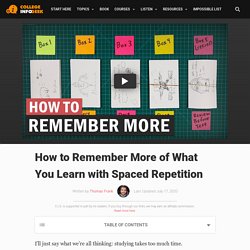
There are only 24 hours in a day, and naturally you’d like to use as many of them as possible for sleeping and, I don’t know, drawing pictures of robot bears or something. To achieve that goal, you need to find a method that lets you spend less time studying while retaining the same amount of information. Here’s the solution: space out your studying. By introducing time intervals between study sessions, you can remember more – even if you spend fewer actual hours studying. This is called spaced repetition, and it may be the most powerful technique in existence for improving your brain’s ability to recall what you study. SpacingGuide. The application of spacing and interleaving approaches in the classroom - impact.chartered.college.
Retrieval Practice. Carousel. Karpicke 2009, Metacognitive strategies in student learning Do students practise retrieval when they study on their own. Roediger and Karpicke (2006) Test Enhanced Learning. Karpicke A Powerful Way. Two Easy Strategies to Improve Multiple Choice Questions. I recently had a meeting with a high school student concerned with their study habits (wow!).
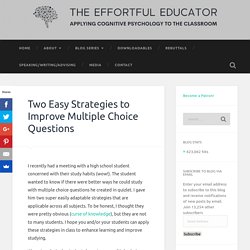
The student wanted to know if there were better ways he could study with multiple choice questions he created in quizlet. I gave him two super easily adaptable strategies that are applicable across all subjects. To be honest, I thought they were pretty obvious (curse of knowledge), but they are not to many students. I hope you and/or your students can apply these strategies in class to enhance learning and improve studying. Almost exclusively, students learn to see multiple choice questions as an exercise of finding the correct answer while ruling out, or even ignoring, all other options. So, let’s take a look at the following multiple choice question: As stated above, with the proper knowledge, a student can easily identify the answer as (D) medulla and move on to the next question.
So, here are the two strategies. Change the stem. Cognitive Science v Neuroscience: retrieval at the start of a lesson or not? – Peer Reviewed Education Blog. With the publication of a neuroscience paper on recall and memory we now have convergence between cognitive science’s research in how memory works [in education] with neuroscience’s research in how memory works.
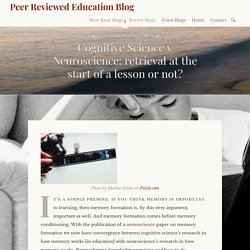
Remembering knowledge over time and how to do something, after a gap of time, are very much vogue in education right now and rightly so. However, this article is about the publication of neuroscience research and what this neuroscience paper suggests about the way some in education will approach their lesson design as a consequence. Let’s get some caveats out the way. The research in this paper is about the brain and formation of memory. It’s not about the more social concept of mind, or indeed what teachers might do with this new knowledge of the brain.
So what does this neuroscience paper say? *Note discussions around the concept of schema. Spaced Repetition for All: Cognitive Science Meets Big Data in a Procrastinating World. The Leitner System. Retrieval Practice in the Collaborative Setting. If you’ve read my blog before, you know I’m a big proponent of retrieval practice.
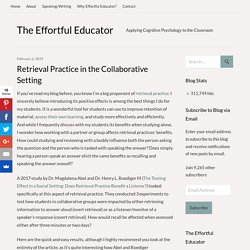
I sincerely believe introducing its positive effects is among the best things I do for my students. It is a wonderful tool for students can use to improve retention of material, assess their own learning, and study more effectively and efficiently. And while I frequently discuss with my students its benefits when studying alone, I wonder how working with a partner or group affects retrieval practices’ benefits. How could studying and reviewing with a buddy influence both the person asking the question and the person who is tasked with speaking the answer? Does simply hearing a person speak an answer elicit the same benefits as recalling and speaking the answer oneself? A 2017 study by Dr. Here are the quick and easy results, although I highly recommend you look at the entirety of the article, as it’s quite interesting how Abel and Roediger manipulated the variables.
Retrieval Practice – the what, why and how of (ahem) total recall – Behaviour Buddy. Reflecting on Exit Tickets. The Education Endowment Foundation ranks it as the number 1 strategy in terms of impact on learning.
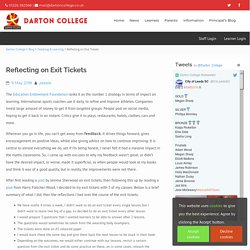
International sports coaches use it daily, to refine and improve athletes. Companies invest large amount of money to get it from targeted groups. People post on social media, hoping to get it back in an instant. Successive Relearning. References and Resources: Rawson, K.

A., Dunlosky, J., & Sciartelli, S. M. (2013). The power of successive relearning: Improving performance on course exams and long-term retention. Educational Psychology Review, 25(4), 523-548. In this recommended youtube lecture (51 min), prof. More on the topic: Another study proved the benefits of spaced retrieval practice in a simulated higher-education learning environment: in very short, students attended a lecture, were tested at the end of it and then again either 1 day or 8 days later. Dr. Interrupting the forgetting – Last lesson, Last week, Last month – The Mill Primary-Teaching Top Trumps. Can you still?
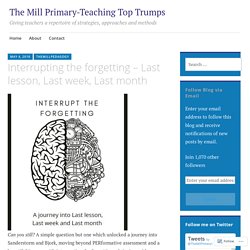
A simple question but one which unlocked a journey into Sanderstorm and Bjork, moving beyond PERformative assessment and a beautiful journey with interrupting the forgetting – bringing evidence informed practice into the classroom. My story starts with an encounter with a slide on my colleague’s whiteboard. It contained a simple slide with three words Can you still? Below this, three questions.
Using Mnemonics For Retrieval Practice. What is a mnemonic?
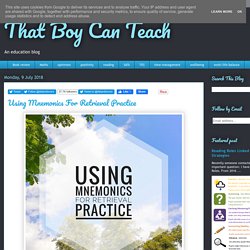
Well, according to Wikipedia it is 'is any learning technique that aids information retention or retrieval (remembering) in the human memory.' To be clear from the outset: an acrostic (such as Naughty Elephants Squirt Water, used to remember the points of the compass) is just one kind of mnemonic. Other kinds of mnemonics are stories, songs and rhymes. In D.T. RetrievalPracticeGuide. Using the Do Now for Retrieval Practice-An Update from Alex Laney.
Remembering Starts with Forgetting A year or so ago I wrote a post about Alex Laney’s Do Nows at Smith’s Wood Academy in Birmingham, England.
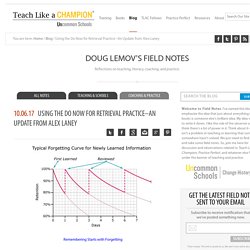
Challenge Grid-Do You Remember?